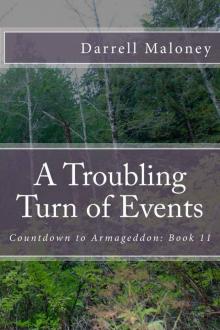- Home
- Darrell Maloney
Her Name is Beth: Alone: Book 5 Page 11
Her Name is Beth: Alone: Book 5 Read online
Page 11
A much better plan.
She walked across the small room and was in the middle of pouring herself a cup when she heard Mark’s voice behind her.
“Good morning. Save me a little.”
Sarah filled the cup and turned to look at him.
He jumped back, as though seeing a hideous monster.
Now, it was true that Sarah was wearing a ratty old house coat which had seen its glory days come and go. Equally ratty fuzzy pink slippers. The mop atop her head looked more like a bird’s nest than hair.
And her face, still sagging from sleep, just didn’t want to cooperate. One eye was opened by sheer willpower and brute force. The other sagged half closed.
Despite that, Sarah was a beautiful woman, and even first thing in the morning she gave other women a run for their money.
But Mark did nothing to reinforce that fact.
“Whoa! You look like death wormed over.”
“Ha! You don’t look so handsome yourself first thing in the morning, Bucko.”
The pair had only known each other for a couple of weeks, but had become fast friends. They’d worked guard duty several times together, and he was still working on training her.
Working in a guard tower for eight hours with nothing to do but talk helped people get to know one another pretty quickly.
She placed her coffee aside and took another empty cup, then filled it for Mark.
“Cream? Sugar?”
“Neither. I’m a man. I drink coffee the way it was intended. As black as a moonless night.”
She turned and handed it to him, and he sat at the table.
While she was opening packets of sugar and creamer to put in her own cup, she commented, “Well, maybe that’s what makes you such a grouch in the morning and me so sweet. Because I get my daily allotment of sugar each morning and you don’t.”
She sat across the table from him and added, “And by the way, it’s warmed. Not wormed.”
“What?”
“You said I look like death wormed over. The correct phrase is death warmed over. And I do not, by the way.”
“Oh, I beg to differ, but you certainly do. Should I go find a mirror?”
She managed a weak smile.
“No. I’ll take your word for it. Later, when I can open both eyes and I’m officially awake, I might punch you in the nose. But for now I’m too sleepy to argue.”
“And it’s supposed to be wormed over. That’s the only way it makes sense.”
“Pardon me?”
“Think about it. Worms eat dead bodies. But dead bodies never get warm again. They stay cold. So death warmed over doesn’t make any sense. Death wormed over does.”
She pondered his argument before slamming the door on it.
“Okay. I’ll admit that what you’re saying makes a tiny bit of sense. But that’s still not how the saying goes. The saying is warmed. Not wormed.”
“The world’s been saying it wrong this time. If they’d come to me first, I’d have cleared it up for everybody and they’d all be saying it right.”
“Oh, my God!”
“What?”
“With everything else going on in the world, we’re sitting here talking about dead bodies and worms.”
He laughed and pointed out, “Well you started it.”
“How old are you, four?”
“Just stating a fact. Why are you up so early on your day off, anyway?”
“I couldn’t remember what day it was. I had to come in here and look at your calendar to see if I had to work today.”
“Nope. You’re off. I don’t have to spend eight hours with you today cooped up in the tower. That’s why I’m in such a good mood.”
“Yet you sit here keeping me company. So I can’t be all bad.”
“I’m only keeping you company so you can refill my coffee cup in a minute.”
“So, you’re crippled now? You can’t refill your own coffee cup?”
“Oh, I can. But coffee tastes so much better when you can sucker someone else into pouring it for you.”
“I see. Hey, while we’re talking about your calendar over there…”
He cut her off.
“Who’s talking about my calendar over there?”
“We are. Now.”
“What about my calendar?”
“You put the expected temperature and weather forecast on there each day. Far in advance. In fact, you’ve got the projected temperatures on there for the rest of the month. And you’re predicting rain three weeks from now. How do you do that?”
“You really want to know?”
“Yeah.”
“Refill my coffee and I’ll tell you.”
Chapter 32
Sarah refilled both their cups and sat back down again.
Mark looked her in the face and commented with a smile, “Wow. This coffee is powerful stuff. Better than makeup.”
“Meaning?”
“Well, your right eye’s not drooping anymore. It’s wide open now, like the left one. And the dark circles under your eyes are starting to disappear. And some of your wrinkles are starting to…”
“Oh, shut up. At least I don’t have gray hair like you do.”
“Want me to go get that mirror again?”
“Oh, shut up. You’re such a charmer. It’s no wonder you don’t have a girlfriend.”
She immediately realized she’d stuck her foot in her mouth.
“Oh, I’m so sorry, Mark. I didn’t mean… I mean…”
He wasn’t fazed.
“It’s okay. I say stupid things sometimes too. Nowhere near as often as you do, mind you. But occasionally.”
She felt terrible. Mark had told her that he’d broken up with his girlfriend just days before the blackout. She’d gone to California to stay with her mother. He said he still had feelings for her and would have insisted she move into the shelter so he could protect her. If only there was a way to call her back. He said he sometimes agonized for her, not knowing whether she was alive or dead.
Now she was desperate to change the subject.
“So then… back to your weather forecasts. I’m fairly certain you didn’t just call the Weather Channel and ask them for their advice, since telephones and weather channels no longer exist. But your brothers tell me you’re right most of the time. How do you do that? Are you some kind of evil sorcerer or something?”
“Nope. I’m evil, but not a sorcerer.”
“So how do you do it then?”
“I told you I used to be a computer programmer, remember?”
“Yes. I remember asking you where your nerd glasses and pocket protector were.”
“Computer programmers are inquisitive people by nature. At least we were, before computers went the way of the dinosaurs. When I wasn’t working, I had a lot of free time on my hands. And we’d been preppers for years. I knew there would probably come a time when we would want to know what the weather was going to be like, so we could use the information to plant crops, plan for winter, know the best time to go fishing, whatever.”
“Okay. That still doesn’t tell me how you did it.”
“Well, if you’d shut up and quit interrupting me you’d know by now.”
“Sorry.”
“Anyway, one day it occurred to me that the local office of the National Weather Service kept data on weather conditions in the Kansas City area, dating back for the last hundred and fifty years. All on their computers, all accessible to the public, and all just ready to be mined.”
“How did they possibly get data from that far back?”
He stopped and glared at her.
“Sorry.”
“Mostly from the farmer’s almanacs. But also from grain processors, gin operators, and private logs kept by local farmers since before Kansas was a state.
“They gathered all the data and put it all together. And when they finished you could look up any date for many generations. And you could find out what the high temperature was for
that date. What the low temperature was. Whether it rained or snowed or sleeted.
“It was a gold mine of information. And I downloaded all the data onto my own computer.”
He paused and looked at her.
She couldn’t sit still, chomping at the bits to ask him a question.
He rolled his eyes.
“Okay, what is it?”
“That’s all nice and all. But it still doesn’t tell me how you make your predictions.”
“They aren’t predictions, so much as they’re actuarial odds.”
“Don’t you use that kind of language with me, young man.”
He laughed.
“Actuarial odds are just guesses based on what has happened in the past, based on cyclical weather patterns and such.
“For example, I had my computer program look at the data for every October 15th for as far back as the data went. Then it analyzed it all and made a prediction for me.
“It found that on twenty percent of October 15ths, rainfall was recorded. And that the average high temperature for each of those October 15ths was seventy degrees. The average low was fifty five.
“All I did was write on the calendar that for October 15th, we had a twenty percent chance of rain, the estimated high would be seventy, the estimated low would be fifty five.
“Of course, those are averages. The temperatures are usually off by a bit. But no more than the local weatherman was before the blackout hit.”
“I’ll be. That’s using your head. I guess you’re fairly intelligent after all.”
“I prefer the term genius myself.”
“Oh, brother.”
“Brilliant works too.”
“If you say so.”
“Or intellectually superior.”
“How about computer geek?”
“How about we change the subject? Since you’re off today, what are your plans?”
“Well, I was going to go back to bed. But the coffee and your superior intellectual conversation woke me up. So I guess I’ll go beautify myself…”
“That’ll take most of the day.”
“Na-uh. Half the day, tops. Then I’ll be out of stuff to do. You got any ideas?”
“I was going to do the monthly maintenance on the ventilation system. You can help me if you don’t mind getting dirty and filthy.”
“Now, how can I possibly refuse an offer like that?”
Chapter 33
A few days prior, on a particularly hot afternoon, Sarah had been pulling guard duty with Mark.
She was sweating profusely, and made a comment to Mark that he must have been the one who installed the large fan in the west wall of the tower.
“No. Actually Jonas installed it. But why do you think I did?”
“Because it’s installed backwards. It’s blowing into the bunker instead of on us.”
Mark laughed uproariously and Sarah suddenly felt foolish.
“It’s not a cooling fan. It’s for ventilation. It’s what provides the fresh air to the bunker and keeps it from getting stale down there. Without the ventilation fan it would be a stuffy place indeed.”
The fan was nothing more than a box fan from a big box store, about thirty inches wide and thirty inches high. It was pressed up against a duct about the same size and set a massive jet of fresh air into the bunker, non-stop, twenty four hours a day.
Except for the winter.
“During the winter we turned it off at night so that it wouldn’t blow in frigid air all night long. We were protected from most of the cold by being ten feet underground and were pretty comfortable in long underwear and long sleeves. Maybe sweaters or sweatshirts.
“But at night, when the temperature dropped to zero or below, the air coming in felt like an arctic blast.
“We took a vote and decided we’d rather live with stale air than subject our ears and noses to frostbite.”
“Didn’t you worry about suffocating?”
“No. Those pipes you asked me about the other day? The ones sticking out of the ground on all sides of the tower? Those are vent pipes, and there are twelve of them. They allow old air to leave very quickly when the fan is running. But even when the fan is off, they allow air to come in and go out. It gets thick and stuffy down here, but it’s enough air to survive.
“The air blowing into the bunker is diffused through a system of ducts which run over all of the shipping containers, in all four wings. It does a pretty good job of forcing fresh air into the bunker, and the fresh air in turn forces the stale air out.”
“So,” Sarah asked. “Exactly what is involved in maintenance of the ventilation system, and why am I gonna get all dirty?”
“You’ll see and you’ll see.”
“Can I finish my coffee and change clothes first?”
“Sure. But I wouldn’t dress in anything fancy.”
“I haven’t dressed fancy in more than a year, Mark. I came here for a wedding that never was able to take place. Luckily I brought jeans and t-shirts in addition to my dresses. And luckily my sister and I are the same size so I can wear her jeans and t-shirts as well. I really miss dressing up, but I guess those days are gone forever.”
“Oh, I hope not forever. I hope that after a few years the violent element goes away and people find a way to get along. Maybe then we can all get out and get to know our neighbors again and start socializing more. Of course, it will be a different kind of socializing, I expect. Instead of going clubbing and shopping with our friends we’ll organize community picnics and dances and such.”
“Oh, I hope you’re right. That might not be a bad thing, either. It might help promote a simpler life, a sense of family that America seems to have lost over the last few generations.”
She rose to go, and said, “How about I change and meet you back here in fifteen minutes?”
“Sounds good. I’ll go get the gear.”
Sarah was on time. Mark wasn’t. Mark got sidetracked by having to look for a box of filters he swore he put in the front supply room.
“Sorry. I had to run them down. I don’t know who moved them, but I finally found them in the back of the generator room.”
“At least you found them.”
“Yep. Follow me.”
He picked up a small step ladder that would make it easier to reach the eight foot high ceiling of the storage containers, and carried it to the first vent a scant ten feet away.
He climbed to the top step of the ladder, pulled a Phillips screwdriver out of his pocket, and removed the slotted vent cover.
As he unscrewed the cover he explained what he was doing.
“When you lived in San Antonio, your air unit operated a bit differently. It drew air from inside your house, sucked it through a filter, then modified its temperature and blew it back out into your house.
“This setup pulls air directly from the outside. Through the gun ports in the tower, through the fan, through the ductwork, and through here into the bunker. The air is unfiltered until it gets to this point.”
He took the two screws from the vent cover and placed them in his mouth, where he tucked them into his right cheek for safekeeping.
Sarah made a face and said, “Be careful. I wouldn’t swallow if I were you.”
He smiled, then reached up to hold a small filter into place while he removed the cover.
He handed the cover to Sarah to hold.
“Okay. Now comes the tricky part. Grab that fly swatter from the wall behind you.”
“Ummmm. Okay. But why, exactly?”
“As I said, the air is unfiltered until it gets here. That means all kinds of things get sucked into the gun ports and through the fan blades. Almost all of them make it into the filter and die. But every once in a while a new arrival is still alive and has to be swatted. Are you ready?”
“Ummmm. I guess?”
He smiled. She couldn’t help but admire the way he was able to look up and talk with screws in his mouth without swallowing them.
&nbs
p; She hoped he hadn’t forgotten they were in there.
He removed the filter and lowered it so he could examine it closely.
Then he lowered it even more so Sarah could get a look at it.
It was covered with a fine coating of dust, a few leaves, and dozens of dead insects. Mostly mosquitoes or houseflies, but there was a nasty looking wasp as well.
“Boy, I’m glad he’s dead. I’d hate to have to be chasing him around here with a flyswatter.”
“That’s why it takes two to do this. Now toss this one into the garbage and hand me another out of the box.”
“How often do you do this?”
“Every three months or so.”
She handed him a new filter, which he put into place before reinstalling the vent cover.
“We’ll do all of these first. That’ll take a couple of hours. Then we’ll go check the outtake vents, just to make sure none of them have bird nests or rodent nests in them. They typically don’t, but it has happened before.”
The thought of dealing with rat nests didn’t excite her much. But then again, neither did dealing with wasps.
Luckily for Sarah, they managed to sweep completely through the bunker and change all the filters without coming across a single live wasp or bee.
They did find a house fly, who seemed very grateful for being set free. He danced around Sarah’s head a few times as if to thank her.
The dancing abruptly stopped when she crushed him against the container’s wall.
When they finished Sarah looked herself over and remarked, “You big liar. You said I was going to get dirty, and I didn’t. Not a bit.”
“Good. So you didn’t mind helping?”
“No, not at all. It was actually kind of fun.”
“Good. You should have another day off in a couple of days, and so will I. Want to help me with my next project?”
“Sure. Doing what?”
“Servicing the wind turbine and refilling the battery bank.”
“Is it hard?”
“Nope.”
“Good. Count me in.”
Chapter 34
As he traveled through New Mexico inching ever closer to Albuquerque Dave decided to try something different.

 A Perilous Journey
A Perilous Journey The Yellowstone Event: Book 6: The Aftermath
The Yellowstone Event: Book 6: The Aftermath Eden Bound
Eden Bound Without Warning
Without Warning Everything Has Changed
Everything Has Changed Rest in Peace
Rest in Peace This Changes Everything
This Changes Everything The Final Chapter
The Final Chapter It Can't Be Her
It Can't Be Her A Troubling Turn of Events
A Troubling Turn of Events The Blockade
The Blockade A Tearful Reunion
A Tearful Reunion Countdown to Armageddon
Countdown to Armageddon Alone, Book 3: The Journey
Alone, Book 3: The Journey The Army Comes Calling
The Army Comes Calling The Grim Reaper Comes Calling
The Grim Reaper Comes Calling Her Name is Beth: Alone: Book 5
Her Name is Beth: Alone: Book 5 Red: The Adventure Begins
Red: The Adventure Begins Rise From The Ashes: The Rebirth of San Antonio (Countdown to Armageddon Book 3)
Rise From The Ashes: The Rebirth of San Antonio (Countdown to Armageddon Book 3) An Unkind Winter (Alone Book 2)
An Unkind Winter (Alone Book 2) A Stunning Betrayal: Alone: Book 9
A Stunning Betrayal: Alone: Book 9 A Whole New World: Ranger: Book 2
A Whole New World: Ranger: Book 2 Return To Ely
Return To Ely A Lesson Learned: Red: Book 3
A Lesson Learned: Red: Book 3 The Homecoming: Countdown to Armageddon: Book 5
The Homecoming: Countdown to Armageddon: Book 5 Final Dawn: Book 12: Where Could He Be?
Final Dawn: Book 12: Where Could He Be? An Acquired Taste
An Acquired Taste On Desert Sands: Alone: Book 6
On Desert Sands: Alone: Book 6 The Battle: Alone: Book 4
The Battle: Alone: Book 4 Any Day Now
Any Day Now Too Tough To Tame: Red: Book 2
Too Tough To Tame: Red: Book 2 No Help From Austin: Red: Book 5
No Help From Austin: Red: Book 5 An Unwelcome Homecoming
An Unwelcome Homecoming A New Start: Final Dawn: Book 9 (Volume 9)
A New Start: Final Dawn: Book 9 (Volume 9) A Stunning Betrayal
A Stunning Betrayal An Undeclared War (Countdown to Armageddon Book 4)
An Undeclared War (Countdown to Armageddon Book 4) One of Our Own: Final Dawn: Book 11
One of Our Own: Final Dawn: Book 11 Texas Bound: Alone: Book 11
Texas Bound: Alone: Book 11 Payback: Alone: Book 7
Payback: Alone: Book 7 The Quest: Countdown to Armageddon: Book 6
The Quest: Countdown to Armageddon: Book 6 The Siege
The Siege The Yellowstone Event: Book 1: Fire in the Sky
The Yellowstone Event: Book 1: Fire in the Sky Return to Blanco (Red Book 4)
Return to Blanco (Red Book 4) The Search
The Search AFTER THE DUST SETTLED (Countdown to Armageddon Book 2)
AFTER THE DUST SETTLED (Countdown to Armageddon Book 2) Death Comes Calling (Ranger Book 3)
Death Comes Calling (Ranger Book 3) A Long Road Back: Final Dawn: Book 8
A Long Road Back: Final Dawn: Book 8